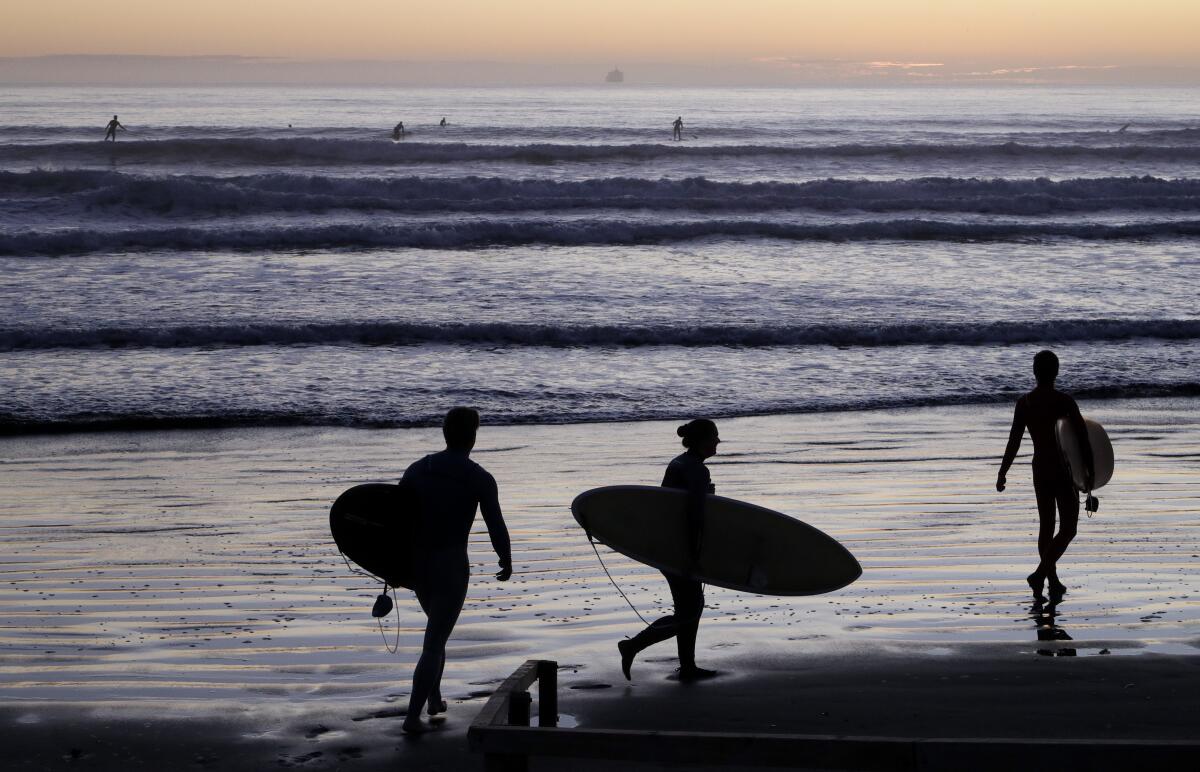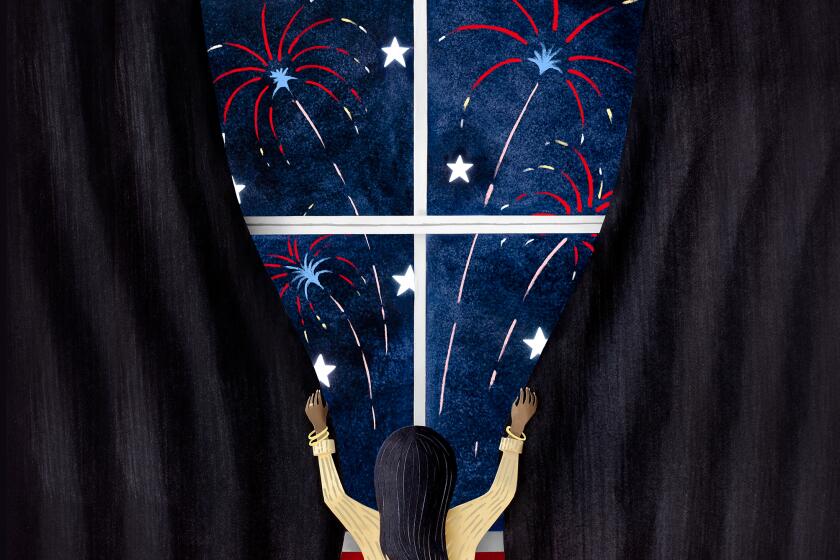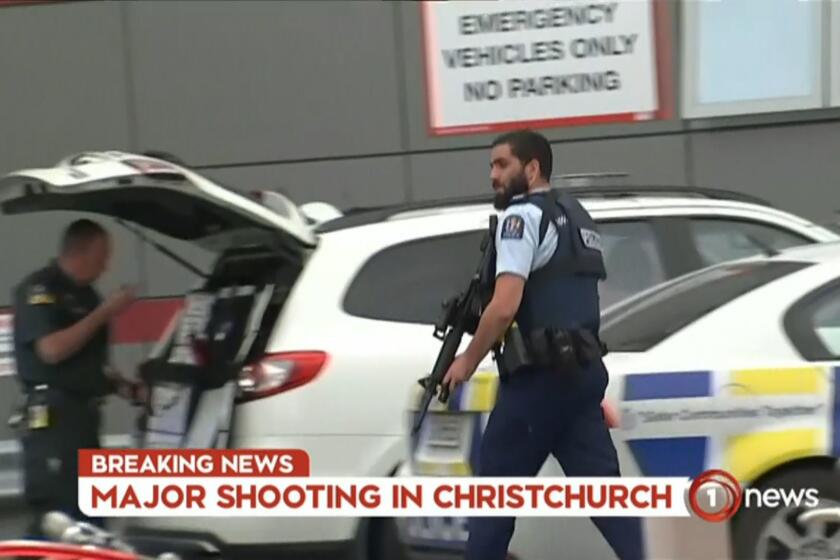Op-Ed: Want to escape America’s Armageddon? Don’t come to New Zealand

- Share via
AUCKLAND, New Zealand — When I lived in the United States and people learned I was from New Zealand, the immediate response was always something about “The Lord of the Rings” films, which were shot here, but I’ve never seen any of them. People also asked, “Why would you leave there to come to the U.S.?” with the same emphasis as one might ask, “Why would you leave Disneyland to come to the dentist?”
As captured onscreen, New Zealand exists as a coveted, isolated elsewhere in the American imagination. That extends to the country’s political image as a woman-led liberal bastion. Prime Minister Jacinda Ardern is known for giving birth while in office, containing the spread of COVID-19 and passing gun control laws. But when “New Zealand” trends in the U.S., it’s rarely because of New Zealand at all. Instead, it’s usually because something has happened in the States that feels apocalyptic, and then Americans panic and Google how to move to New Zealand.
As a child of immigrants, I am American. But I couldn’t raise my own kids to believe that hiding their faith and identity was reasonable.
Some noticeable peaks in “New Zealand” as a search term include November 2016, when Donald Trump won the presidential election, and then last month, with the overturn of Roe vs. Wade. When Americans look up New Zealand residency applications, it’s not because they want to live in Christchurch. It’s because they want to move elsewhere. Anywhere. As far away from where they do live as possible.
It might not be such a bad thing if everyone repelled by the recriminalization of abortion were to migrate Down Under, if it weren’t for all of the billionaires who are already here. You see, if American liberals idealize New Zealand as a remote island of 5 million environmentally ethical social progressives that they could fit into, then the American superrich see it as a remote island of environmentally ethical social progressives that they could take over.
Billionaires have been buying luxury bunkers here for years in order to invest in what they perceive to be their best possible chance at surviving Armageddon. PayPal co-founder Peter Thiel raised eyebrows in New Zealand in 2017 when news of his under-the-radar residency became public, and in recent months, he has faced resistance from local government planners over his proposal to build a five-star guest lodge in the South Island. Meanwhile, he’s backing right-wing U.S. congressional candidates who align with President Trump and advocate for stricter U.S. border laws, despite his bending of New Zealand residency restrictions to suit himself.
Not that Thiel seems eager to claim being Kiwi, so why pay the high price for our passport? On the one hand, the country’s geographic isolation makes for a promising haven in the event of war or disease. On the other, the sea level is rising, New Zealand is sinking and we’re so quake-prone that the whole place shakes like an aging chihuahua. We’ve got high road fatalities, barely any military presence and one of the biggest threats to our national well-being is a possum infestation.
Why is it, then, that the rich have their money on us to survive the apocalypse? They don’t, is the answer. They don’t anticipate New Zealand as it stands, nor its people, surviving the end of the world, but that’s part of the charm. For them, we’re an easy conquest if the rest of the world goes to hell.
Known for having more sheep than people and, until recently, having a publicly funded wizard, New Zealand’s publicity team works harder than Kris Jenner to position the country as unintimidating and placid — Australia’s harmless sidekick. We cash in, every year, on being named one of the happiest countries in the world and one of the least corrupt countries in the world.
New Zealand also touts its racial diversity and support of Maori, including in government representation. In reality, we’re more than 70% white and our youth suicide rate is high. As for corruption, New Zealand has no taxes on capital gains or inheritances, and it doesn’t tax existing wealth either. Public scrutiny of company property ownership is minimal, and there is little to no public registration of trusts. And, as Thiel made so clear, if you’re wealthy enough, you can buy your way across the border.
“Don’t go to the mosque.”
I wonder whether the superrich would consider New Zealand to be the best locale for their doomsday bunker if it really were, in fact, one of the least corrupt countries in the world and they had to spend 1,350 days here to obtain a right to citizenship, like other newcomers.
Don’t get me wrong. There’s no nuclear power, abortions are legal, guns are highly regulated in New Zealand and you’re never more than 80 miles from the sea. It’s beautiful, but it isn’t Disneyland and it isn’t your elsewhere.
The country you’re imagining, the one you’ve been sold, it doesn’t exist. We’re as sad, racist and corrupt as the rest of the world, and, nowadays, there are a bunch more billionaires to boot.
Diana Clarke is a writer and teacher based in New Zealand and author of the recent novel “The Hop.”
More to Read
A cure for the common opinion
Get thought-provoking perspectives with our weekly newsletter.
You may occasionally receive promotional content from the Los Angeles Times.












